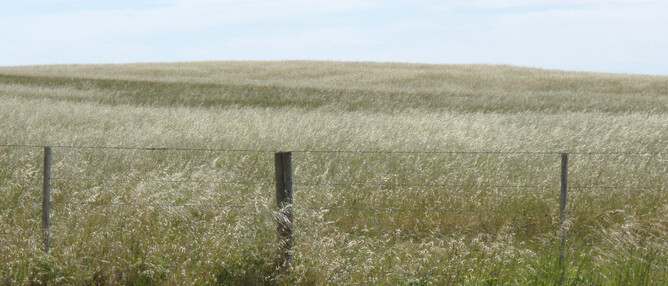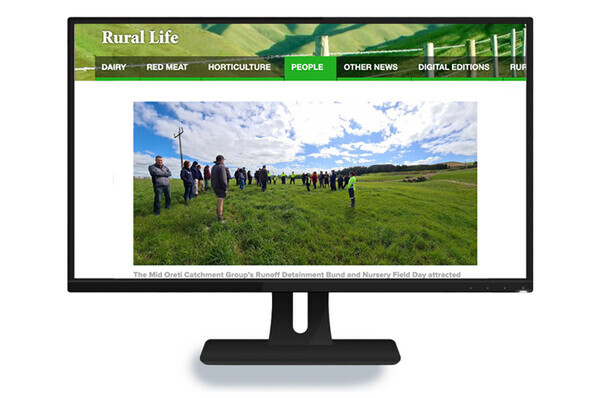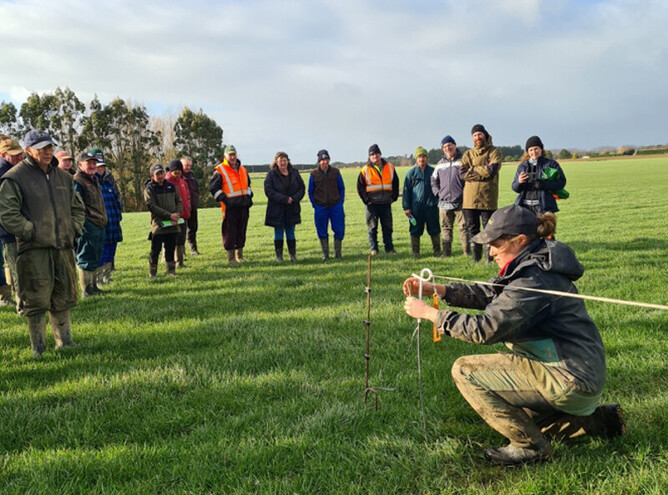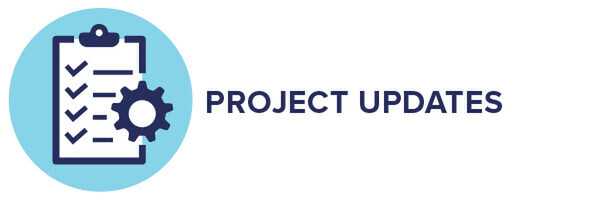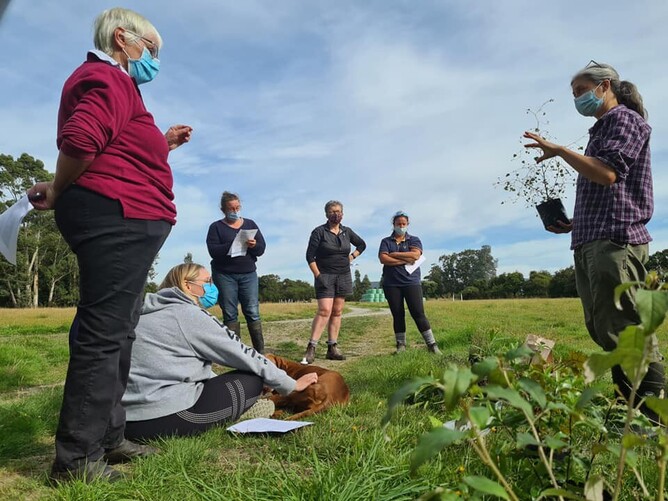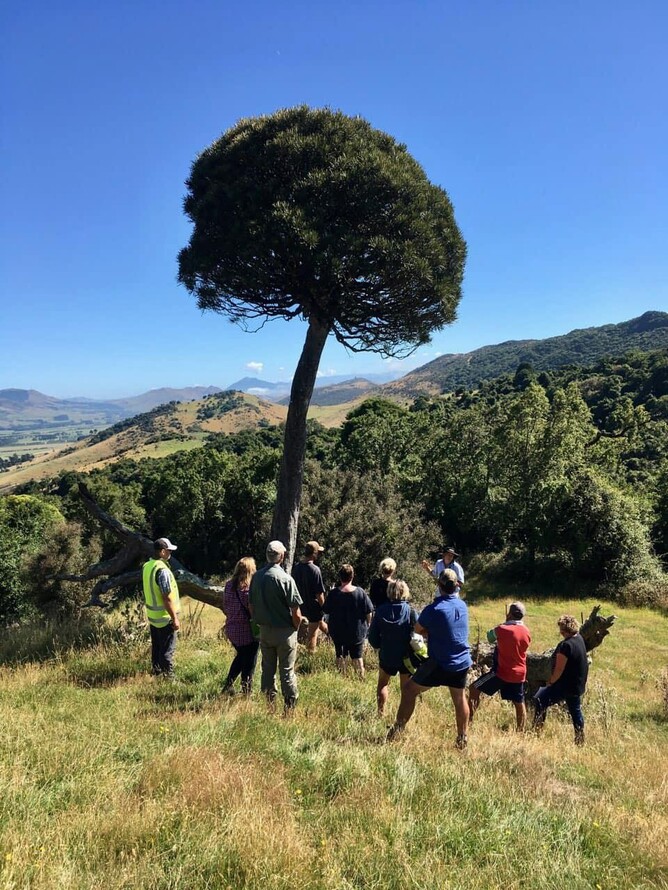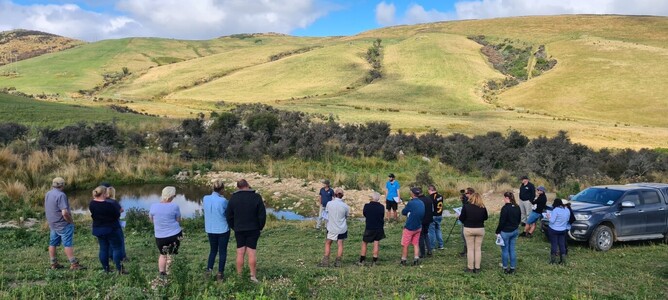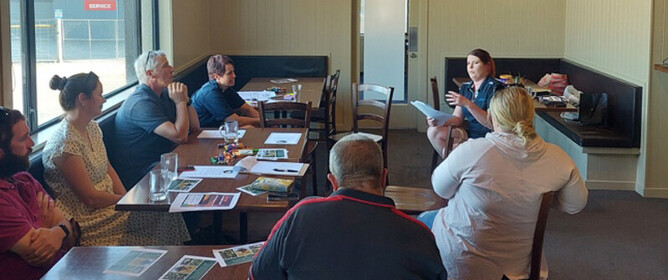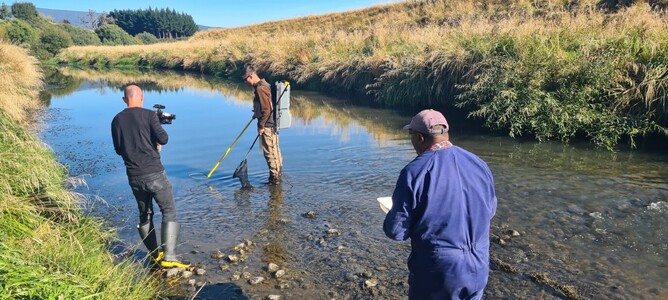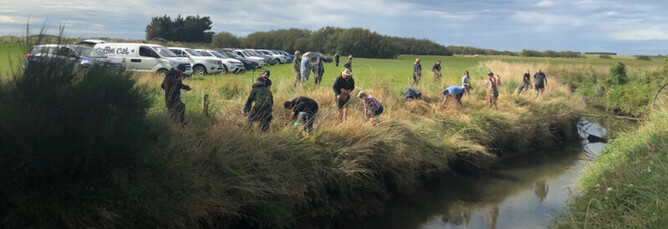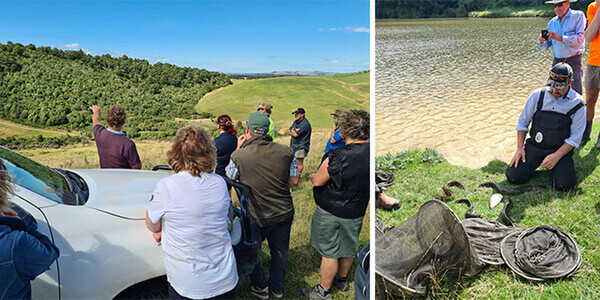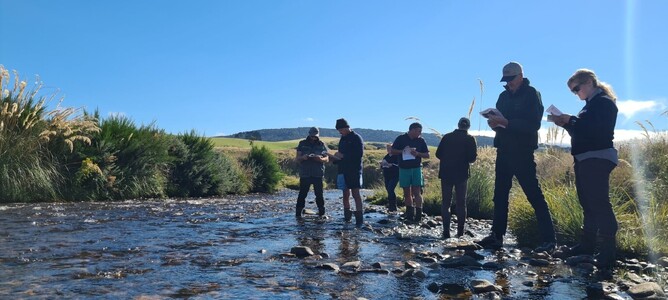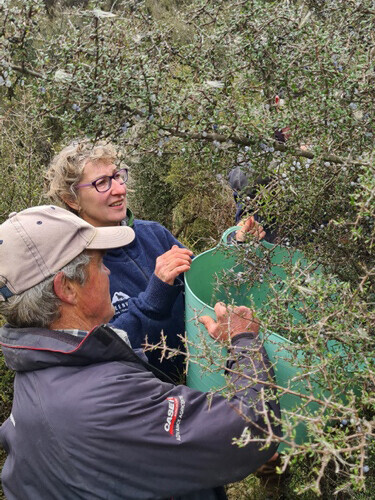Welcome to our April newsletter!
One of the highlights this month was the visit from Landcare Trust’s Sam The Trap Man to talk to Richard Kyte about the origins of Catchment Groups in the region.
There were about 18 Catchment Groups already established in the region when Thriving Southland got underway - and that number has jumped up to about 30 now. Check out the video - it’s a great interview about how Catchment Groups developed organically, and the ideas and projects that are flowing from there.
During February and March Catchment Groups have taken advantage of the long daylight hours to run informative events; from seed collecting to planning, and planting to stream walks and tips on utlising unproductive land.
Check out the event write-ups and project updates in this newsletter – there is so much happening throughout Southland by our fantastic Catchment Group communities.
We hope everyone is staying safe out there, and keeping connected with others. The weather is certainly not helping on top of COVID-19, a phone call to a friend or neighbour can make all the difference. Rural Support Trust is also available to support, so please don’t hesitate to reach out for a confidential chat about you, your business, the weather, your finances, or for a neighbour, partner, friend, family/whānau member, or worker. You can reach them on 0800 787 254 (0800 RURAL HELP).
As we work through the current COVID-19 outbreak, coupled with dry conditions, we have many Groups with events in the wings just waiting for a few things to be confirmed. Dates, location and details are being firmed up, so keep an eye out on the website and Facebook to make sure you don’t miss an event.
Sam The Trap Man checks out Southland Catchment Group happenings
Check out episode one of the new NZ Landcare Trust 'Brew with a View' series, featuring host Sam the Trap Man chatting with our very own Richard Kyte about Southland’s Catchment Groups.
Catchment Group happenings hit the headlines
It was great to see the Mid Oreti Catchment Group and other Groups making headlines with some of their projects and ideas during March - great stuff! Check out the Mid Oreti story here.
Catchment Group Profile
Lower Oreti Catchment Group
How did the Group start?
Dating back to 2019, six keen locals attended events run by New Zealand Landcare Trust, Thriving Southland and other Southland Catchment Groups, and decided in March 2021 to start their Group with a Wintering Field Day. With 50 people attending it was a huge success.
The Group was formed to help farmers and the local community better understand the challenges faced around balancing farm production with sustainable land use, and improvements in water quality and biodiversity.
The Group is all about identifying opportunities and driving farmer-led, grassroots action in the local area. Everyone is welcome.
What area does the Group cover?
The Lower Oreti Catchment Group covers the lower reaches of the Oreti River catchment, from Spar Bush in the north, to Ferry Road in the South, and borders the Waimatuku catchment in the West and the Hedgehope-Makarewa catchment in the East.
What projects and events have been happening/are planned?
Our aim is to work on projects that are useful to our catchment and the local community:
- Know your catchment – issues and actions
- Wetlands and sediment traps workshop
- Understand stream health and water quality
- Farm Environmental Plan assistance
- Riparian planting assistance
- Wintering system trials
- Pest management and trapping programme
- Hosted events / meetings
Best way to get in touch?
Group coordinator, Sarah Thorne on 027 588 5200 and sarah@thrivingsouthland.co.nz
English as a second language project
Last year Mid Oreti, Lower Oreti and Waihopai Catchment Groups started working together on a project to find out what support English-as-a-second-language (ESL) farm workers needed to improve their understanding of wintering Good Management Practices.
Thriving Southland provided $3000 to run a mini scoping project to understand needs and barriers for local ESL farm workers. Nicola McGrouther from Creekside Consulting met with local ESL farm workers and different agencies to hear their views and ideas.
The scoping project results are now in and the three Oreti Catchment Groups have already brainstormed their next steps for the project, which they hope will lead to more international farm workers involved in their Catchment Groups. There are 12 ideas on the list, and they hope to share their progress and ideas soon.
Understanding our Landscape, and Winter Crop Cultivation Trial Projects progressing at pace
Hedgehope Makarewa Catchment Group have been working on two big projects over the last year; Understanding our Landscape and a Winter Crop Cultivation Trial. Both involve working with local experts and farmers to compile knowledge and information that landowners and rural professionals can easily access and use, to help prioritise on farm investment and actions to reduce losses in N, P and sediment from the land.
Working with the Southern Dairy Hub, the Hedgehope Makarewa Catchment Group extended the Hub’s Winter Crop Cultivation Pilot study onto ten commercial farms across Southland. They tested whether utilising alternative crop establishment methods to conventional cultivation (e.g. direct drilling, strip tillage, air seeding, precision drilling etc), for fodder beet, swedes and kale, improves soil structure and strength. Which would lead to a reduction in pugging and improving animal welfare during winter grazing. With the help of farmers and volunteers they gathered a huge amount of data which is almost ready to share.
The Catchment Group’s Understanding our Landscape Project has seen the Group work closely with Clint Rissmann and his team at Land & Water Science. Their aim is to help people better understand the Hedgehope-Makarewa Catchment by developing an online picture (model) using scientific data sets which pull together the information in a really easy to understand way, and help landowners and managers make great decisions on future mitigations for their farms.
Phase 1 involved a high resolution stocktake of all the environmental data and map layers for the 111,940ha catchment, with development of a hydrological layer that captured all zones, water sheds and stream networks. This work also covers the Makarewa Headwaters Catchment Group area, and will help them with their LUCI-Ag project with Ravensdown (more information to follow in another newsletter).
Phase 2 has involved ground truthing soil information, and creating sub-catchment reports to help landowners understand the opportunities for their property’s landscape. This is being followed by the development of four Case Study Farms (in different sub-catchments) to show how this information on a property scale can be used to help landowners and managers work out what mitigation options to invest in, and where they should be put on their property, and how to get the most out of them.
Keep an eye on the Thriving Southland Facebook page, website and newsletter for more information on these great projects and their results.
Beyond Regulation Mataura Catchment Project
A new video resource will be available on the Thriving Southland website this month, explaining the development of the model that provides scientific landscape data to help farmers make really good decisions about their land and waterways. It’s a great way to learn about the project and its usefulness to you and your farm.
Thanks to Rob Dingle, Clint at Land and Water Science and Richard Kyte for being part of the video.
Give it a go!

Thriving Southland is launching a new campaign in April to help motivate and empower Catchment Groups, farmers and community members to give it a go! It’s also our way of saying thank you to those that have given it a go! We will be profiling some of the great events and projects that have taken place over the last 18 months. Keep an eye out on Facebook and in the media for the campaign.
Catchment Group Events
Recent Events
Hedgehope Makerewa Catchment Group field day an amazing experience
It was a gem of a field day in late February with Jesse Bythell from QEII National Trust and the Hedgehope Makerewa Catchment Group crew at the Sinclair Covenant. We learnt about the top five bush species to start your own farm plantings with, and how to collect seeds and bring them on. Jesse answered all our questions on potting mix, containers, nurturing seedlings, and many, many more!
Thank you to Jesse for the amazing way she shares her knowledge, and to Nan Sinclair and family for letting us walk through their wonderful QEII covenant (also known as Sherwood Forest). Final thanks goes to Sandra Campbell for donating Carex and Ribbonwood seeds, and seedling Cabbage Trees, Manuka and Koromiko. Jesse recommended the New Zealand Plant Conservation Network (NZPCN) as a great place to get info on native plants, and Lawrie Metcalf's book on The Propagation of New Zealand Native Plants as a guide for native plant growing addicts.
Greater Dipton Catchment Group native seed collecting field day at Gavenwood Farm
Glorious weather, great experts and keen locals made for a really good native seed collecting field day at Gavenwood Farm in late February, followed by a useful native plant propagation demonstration at the Lumsden Community Nursery. Thank you to Peter McDonald and Kim Spencer-McDonald for organising and hosting on behalf of the Greater Dipton Catchment Group, and for the wonderful expertise of Josie Blackshaw from Reforest Southland and the Lumsden Community Nursery, and Jesse Bythell from QEII National Trust. A great time was had by all. Fingers crossed that the seeds collected turn into strong seedlings using Josie's top tips.
ACE Sediment Traps and Wetland Field Day covers all the bases
We had a fantastic day on farm, exploring three of the sediment traps recently installed. We talked technical details, basics, process, planning and most of all how they can fit into your farm plan. Thanks to the Drummonds for hosting us, Fonterra for facilitating, Environment Southland and Keith for all the technical support and Thriving Southland for making the field day possible.
Missed out? We filmed the day and have fantastic resources if you would like to check them out.
Mid Oreti Catchment Group annual catch up and planning meeting
Great people and ideas made for a fantastic time at the Mid Oreti Catchment Group annual catch up and planning meeting on 2 March. Looks like an exciting year ahead! Watch their Facebook page for more info.
Mid Aparima Catchment Group Stream Walk a virtual masterpiece
This year’s Stream Walk is a little different. Nothing beats being there in person, but with the current Covid outbreak, we've made a virtual stream walk for you enjoy from the comfort of your home. Keep an eye out on the Facebook pages for the video release.
Lower Aparima Catchment Group planting day full of useful tips
We had an informative Lower Aparima Catchment Group planting session at Kim and Corey White’s property near Riverton on 8 March.
Twenty-five people came to get planting tips from Michael from The Plant Store who ran through the basics of planting natives near waterways and how to get them to thrive. Thank you to Ōraka Aparima Rūnaka, who generously supplied the plants. Michael’s tips included good planning, so the right plant goes in the right place, and then a little bit of ongoing maintenance.
Pioneer species, such as flaxes are good to plant first but they can get quite big so plant them far enough away from fences. Post-planting tips are to keep stock away and to keep up with weed control.
About 40 natives were planted, complete with mats and protectors to keep them snug and safe. Some great questions were asked, such as “how far inland is salt burn found on plants?” The answer, “as far inland as Makarewa”, Michael said. Coffee from the Coffee Cat and bacon and egg pie went down very well.
Greater Dipton Catchment Group Day Family Farm Tour
Have the confidence to give it a go was a key message from the field day at Malcolm, Sue and Tom Day's farm near Dipton on 8 March.
Stunning weather, along with passionate and knowledgeable speakers made it a great afternoon for the 22 people who joined in this Greater Dipton Catchment Group event.
It was an inspiring afternoon looking at lots of sites around the farm. Plenty of questions were asked as we saw how multiple generations have made changes to improve human and stock safety, biodiversity and environmental outcomes, and practical and profitable farm systems. We saw sediment traps, fenced regenerating natives, trees strategically planted in blocks - red beech, blackwood and pines, and heard handy hints on wetland creation, good native plant mixes for shelterbelts and how to set them to grow well and last, as well as the value of tussocks for low shelter and water retention.
Thanks to Zane Moss from Southland Fish & Game, who spoke about how to create a wetland or wetland system on your property, and how they can benefit your farm system and native biodiversity.
Orepuki Catchment Group ACE Stream walk 2022
The Waimeamea Stream was teeming with life at our recent streamwalk. We saw and caught a range of native fish, showing there is a strong healthy population present in the stream. There were more bugs in the MCI sample then we could count! We are looking forward to getting the eDNA results back to confirm all the species we identified. Thanks again to the amazing support crew, Thriving Southland, Southland Fish & Game and Environment Southland, that make these stream walks possible.
Waikaka Stream Catchment Group seed collecting session
The Waikaka Stream Catchment Group got out and about seed collecting during March, learning how to grow their own native plants in the Waikaka Valley. Coprosma was on the menu, with lots of seed squashing and tasting.
Upcoming events
Note: Please refer to the events page on our website www.thrivingsouthland.co.nz for the most up to date event information, as things may be subject to change because of the COVID-19 traffic light settings, and other Government and venue requirements at the time of the event.
_______
NEW DATE!
Understanding our water quality – Mokoreta,
hosted by the Mokoreta Catchment Group
27 April, 6.30pm to 8.30pm
Mokoreta/Redan Hall
Join Justin Kitto, DairyNZ water quality specialist, to hear about data for the Mokoreta River, eDNA sample results and answer questions. Light supper provided.
For more information contact Matt McRae on 0274625040, Stu Cameron on 0272886901 or Sandra Campbell, Thriving Southland on 021400431.
_______
NEW DATE!
Understanding our water quality – Glenham,
hosted by the Glenham Catchment Group
28 April, 6.30pm to 8.30pm
Glenham Hall
Join us for a community event to start discussions about a Glenham Catchment Group. Justin Kitto, DairyNZ water quality specialist, will be presenting available water quality data for the Glenham Catchment streams and discuss eDNA sample results. Light supper provided.
For more information contact:
- Dean Rabbidge on 0278733527
- David Clarke on 0276222325
- or Sandra Campbell, Thriving Southland on 021400431.
_______
Grow Your Own Native Part 2 – Trees, hosted by the Mid Oreti Catchment Group
Thursday 28 April, 4.30pm to 6.30pm
AB Lime Office, 10 Bend Road, Winton
Everyone welcome!
The event is weather dependant. Vaccine pass, masks and sign in required (all subject to rules at time of event – keep in the loop with our Facebook page
Following on from the success of their Grow Your Own Natives Workshop Part 1 – Carex, Flax, Tussocks and Toetoe, Mid Oreti Catchment Group would love you to join them for an evening of collecting and sowing your own native tree seeds at the AB Lime native forest block – Motu Ngahere. You can also explore their short loop track, and get some plant identification tricks and tips.
Transport onsite will be required by 4WD, so bring your own 4WD if you have one, or jump in with someone else when you arrive.
Don’t forget to wear sturdy footwear and bring your own container to sow your seeds in – ice cream container sized or bigger is great. You are welcome to bring spare containers too for other people to use if you have lots lying around your house.
Have a great April,
Ngā mihi
Richard Kyte (Thriving Southland Project Lead) and the Thriving Southland Team
